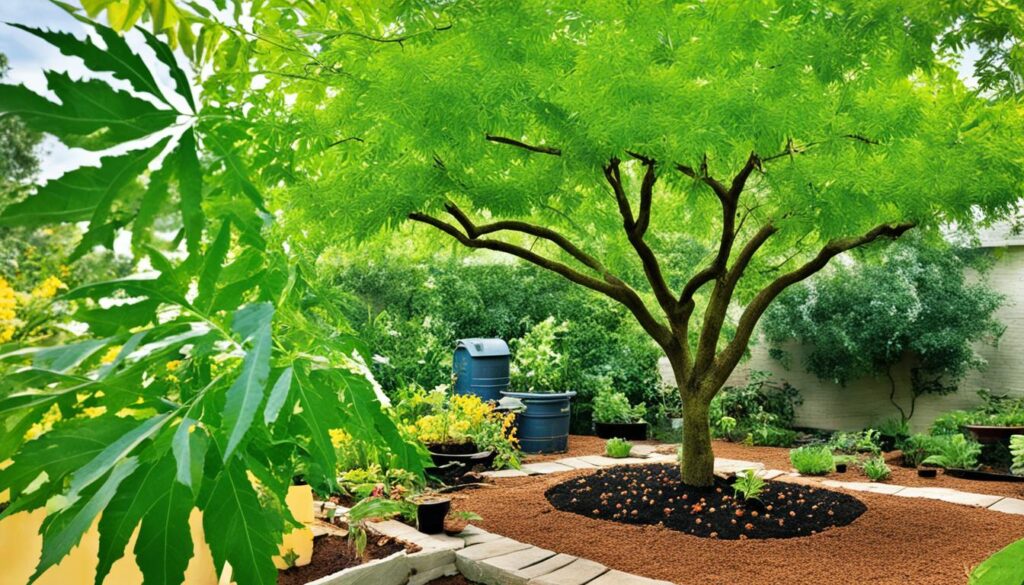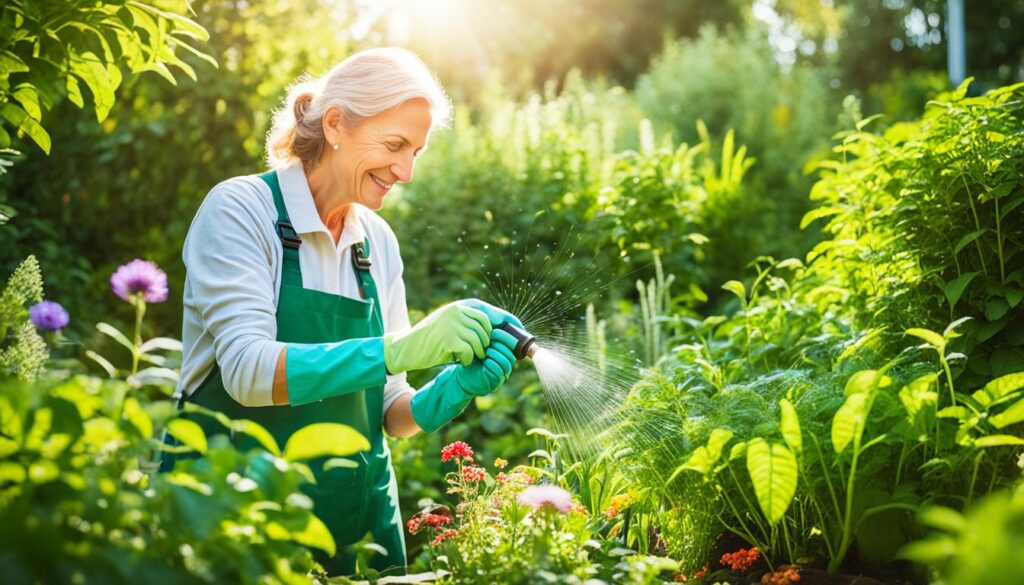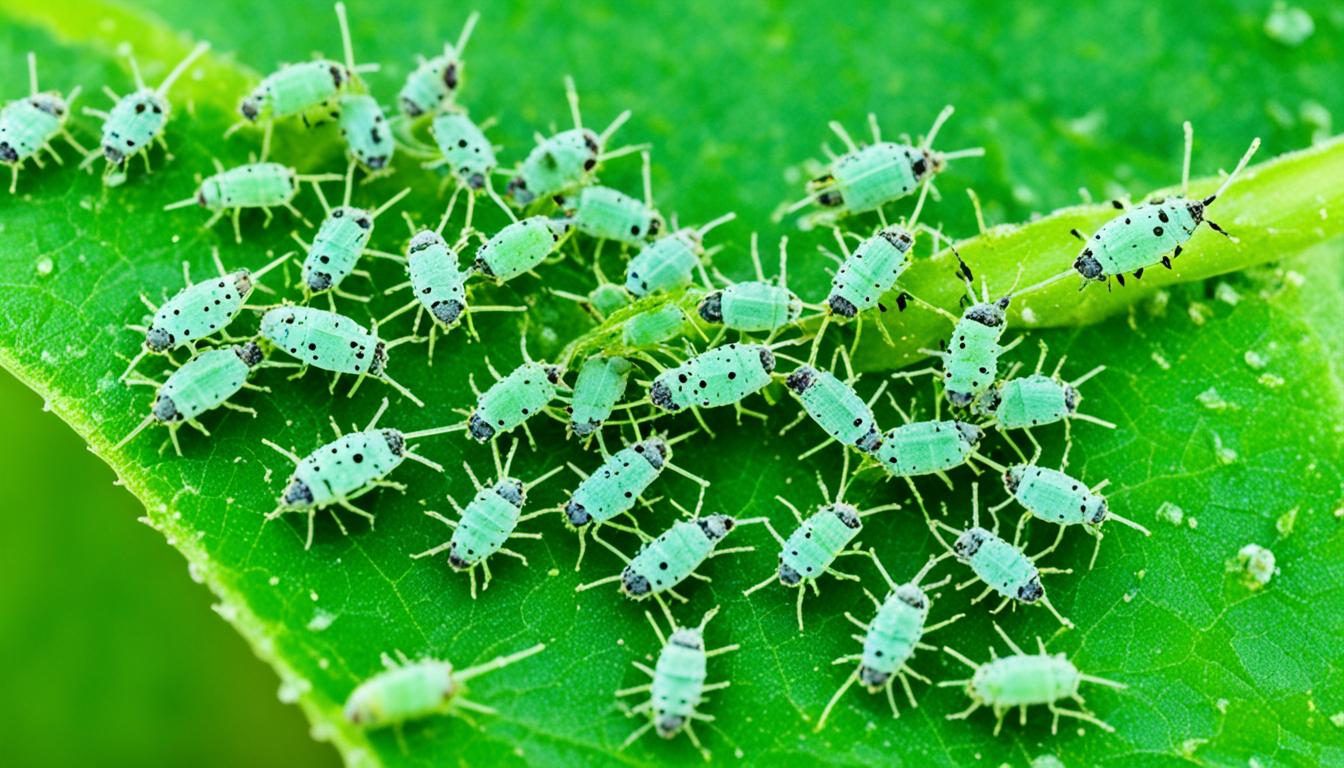Do you face a big problem with garden pests? Want to find natural ways to control pests? You’ve come to the right place. I’ll share six eco-friendly tips to fight off bugs without bad chemicals. By using these methods, you’ll keep an organic balance in your garden. This means saying no to harmful sprays while keeping your plants safe from pests.
Image:
Companion Planting for Natural Pest Control
Companion planting is an old but powerful method for keeping pests off your plants. It uses the natural strengths of certain plants to chase bugs away. This way, you don’t have to use harmful chemicals.
Marigolds are great near potatoes because their scent scares off aphids. Onions and garlic help too, by making a strong smell that insects don’t like. This keeps your crops safe.
Mint plants smell nice and keep flies, beetles, and ants away. Herbs like basil, oregano, and rosemary are not just for cooking. They also make mosquitoes stay clear, perfect for your chill-out spots outdoors.
Lavender isn’t just calming for you; it’s annoying for fleas and mosquitoes. This makes your garden a more pleasant place for everyone.
By planting the right mix of herbs and flowers, your garden can be safe from bugs the natural way. Don’t forget, the right plants can also bring helpful insects. For example, ladybugs and hoverflies eat the bad bugs, helping your garden stay in balance.
Check out our list below to see which plants are best for keeping specific pests away:
| Companion Plant | Pests Repelled |
|---|---|
| Marigolds | Aphids |
| Alliums (Onions, Garlic) | Insects |
| Mint | Flies, Beetles, Ants |
| Basil, Oregano, Rosemary | Mosquitoes, Pests |
| Lavender | Fleas, Mosquitoes |
As seen in the table, combining certain plants can naturally keep pests away. So, grow these friendly plants next to your favorites. You’ll enjoy a garden that’s good at taking care of itself.
Beneficial Insects for Natural Pest Control
Encouraging beneficial insects in your garden is a smart way to keep pests in check. These good bugs eat the bad ones, helping you control pests naturally. You’ll avoid using harmful chemicals by inviting these insects into your garden. We’ll look at some important beneficial insects and their role in a healthy garden.
Ladybugs: Warriors Against Pests
Ladybugs love eating aphids, which makes them perfect for your garden. They can eat 50-60 aphids each day! Besides aphids, ladybugs also enjoy dining on mites, scale insects, and mealybugs. You can attract them by growing plants like daisies, marigolds, and sunflowers. Also, leave spots in your garden with shelter, like under rocks or leaf litter, for their eggs.
Praying Mantises: Nature’s Predators
Praying mantises are like garden ninjas, hunting down pests like flies, aphids, and spiders. They’re famous for their posture, which looks like they’re praying. With strong front legs that have sharp spines, they’re masters at catching and holding prey. To bring these cool insects to your garden, make sure there’s a mix of plants for them to hunt in. Stop using harmful chemicals, as they can hurt mantises and mess up your garden’s balance.
Other Beneficial Insects
There are more beneficial insects out there helping with pest control:
- Spiders: These eight-legged hunters tackle pests like flies and caterpillars. Letting spider webs stay in your garden gives them a home.
- Wasps: Wasps take care of pests too, like caterpillars and aphids. Provide them with flowers to keep them around, but watch out for their nests.
- Dragonflies: Dragonflies eat flying pests and need a water source for their young. A pond or simply a shallow water dish will do.
- Lacewings: Lacewings dine on aphids, mealybugs, and other soft insects. Planting dill, coriander, and fennel will help attract them.
Creating a Habitat for Beneficial Insects
To make a good home for beneficial insects, here’s what to do:
- Plant various flowers, herbs, and shrubs that offer food and shelter for the insects.
- Don’t use chemical pesticides, as they not only hurt insects but mess with your garden’s ecosystem too.
- Stick to organic gardening to keep the environment friendly for helpful bugs.
By welcoming beneficial insects like ladybugs and praying mantises, you can keep your garden healthy. This approach leads to a more balanced and flourishing outdoor space.
Neem Oil as a Natural Insecticide
Neem oil is an awesome choice for fighting off garden pests. It comes from the neem tree and works as both a bug killer and a bug repellent. This makes it great for many different pests.
It stops bugs from eating and making more bugs. So, it’s good against many pests like bugs that suck plant juice, or the ones that make leaves look white. Neem oil won’t harm good bugs like bees and ladybugs.
To use neem oil, mix it with water and a little soap. Then, spray it on the plants, especially the bottoms of the leaves. You should do this every 7 to 14 days to keep the bugs away.
Neem oil is a green and safe choice for killing bugs without chemicals. It helps keep your garden healthy without hurting the environment. This makes it a key part of a natural pest control plan for your garden.
Check out the picture below to see the neem tree, where this great bug-fighting oil comes from.

Organic Bug Sprays for Natural Pest Control
Keeping your garden safe from pests doesn’t have to use harsh chemicals. Organic bug sprays offer a safe and effective way. They help keep your plants safe while being kind to the environment.
Insecticidal Soap
Insecticidal soap is easy to make at home and won’t cost much. It can kill and keep away pests that attack your garden. Just mix water, liquid soap, and a little cayenne pepper. Put it in a spray bottle and use it on your plants. The soap kills pests by dehydrating them. It works well against bugs like aphids, spider mites, and whiteflies.
Garlic Spray
Garlic spray is great for keeping soft-bodied bugs away. It’s simple to make. You just blend garlic cloves with water, then strain. Put this water in a spray bottle. When you use it, the garlic smell repels pests but doesn’t harm helpful bugs.
Vinegar Spray
Vinegar spray not only fights off bugs but also can kill weeds. It’s made by mixing vinegar, water, and a bit of dish soap in a spray bottle. Then shake and spray it on the plants you want to protect. The vinegar messes with pests’ nervous systems. Plus, the soap makes it stick better. This spray is good against ants, aphids, and more.
Making your bug sprays can keep your garden safe without harmful chemicals. They’re safe, cheap, and good for the planet. So, use these organic options and keep your garden free from intruders!
Physical Barriers for Pest Prevention
Preventing pests in your garden is key, and physical barriers work really well. They block insects and help keep your garden healthy. Row covers and mesh screens are popular for keeping pests away.
Row Covers: Shielding Vulnerable Plants from Flying Insects
Row covers are sheets of light fabric that protect plants from flying insects. They create a barrier over plants that insects can’t get through. This keeps pests like aphids and cabbage worms away while letting in sun and water. They’re perfect for anyone wanting to grow things organically.
To use row covers right, choose covers that fit your plants well. Make sure the covers are tight over the plants, leaving no open spots for bugs. You should also secure the edges with rocks or staples. Just remember to remove them during pollination and put them back after.
Mesh Screens: Safeguarding Fruit Trees and Berry Bushes
Mesh screens are great for keeping birds and insects off your fruit trees and berry bushes. They work by creating a barrier that pests can’t get through. This way, your fruit stays safe and undamaged.
Properly measure your plants to pick the right size screen. Install it snugly around the plants, ensuring there are no gaps. They should be strong and cover every part of the plant. Always check for tears and replace parts as needed.
Comparison of Row Covers and Mesh Screens
| Physical Barrier | Advantages | Limitations |
|---|---|---|
| Row Covers |
|
|
| Mesh Screens |
|
|
Row covers and mesh screens aren’t forever ways to keep pests out, but they do a good job for a while. Using these with other natural methods can protect your garden. It ensures your plants stay healthy and productive.
Proper Garden Maintenance for Pest Control
Caring for your garden well is vital for keeping pests away and your plants healthy. With the right care, you make your garden less appealing to pests. This also helps your plants fight off diseases and bugs better.
Weed Removal
Getting rid of weeds is a big part of garden care. Weeds can hide pests and give them a place to grow. By checking your garden often and pulling out any weeds you see, you can stop pests from settling in.
Proper Watering
Watering correctly stops pests from getting comfy in your garden. It’s best to water deeply but not too often. Too much water can bring pests like slugs. By watering wisely, you help your plants stay healthy and keep pests away.
Nutrient Balance
Plants need good food to stay strong against pests. Make sure your garden has rich soil full of what plants need. With the right nutrients, your plants will have a better chance against diseases and bugs.

Keeping your garden in good shape is like finding the right balance in life. If you take out the weeds, water just right, and feed your plants well, your garden will be a place pests don’t want to be in. Plus, your plants will be happy and healthy.
The Impact of Pesticides on Humans and Pollinators
Pesticides affect both people and pollinators. Studies show traces of pesticides in the urine of those who eat store-bought fruits and veggies. Even though levels the EPA says are safe, these findings suggest risks to our health from pesticides. This is also true for farm workers and their families exposed to these chemicals.
Neonicotinoids, or neonics, are especially worrying. They’re used on big crops and linked to the drop in bees. Bees are vital for plant reproduction, affecting the growth of many food plants. The use of neonics endangers ecosystems, risking the survival of plant species.
The Impact on Human Health
Pesticides in food and our surroundings can harm us. Research links these chemicals to several health issues like respiratory problems and cancer. This shows we need safer ways to control pests.
The Decline of Pollinators
Pesticides like neonics are reducing the number of bees and other pollinators. This is bad for ecosystems and for growing food. Bees are essential for many food plants. Without them, plant yields would be much lower.
This decline isn’t just bad for nature but it also affects our food. It could lead to less food and harm the homes and food sources for other animals.
| Pollinator Decline: Causes and Consequences | Actions Needed |
|---|---|
|
|
We must deal with the effects of pesticides on our health and on pollinators. This means promoting safer farming methods, teaching people about the value of pollinators, and making stricter rules on pesticide use. These steps can protect us, our environment, and the future.
Using Plants for Natural Pest Control – Sustainable Benefits
Plants can work wonders in keeping your garden pest-free. They offer sustainable advantages, helping our environment and making your garden thrive.
Increasing Biodiversity
Letting plants fight pests boosts the variety of life in your garden. Plants like dill, fennel, and tansy bring in helpful bugs, including ladybugs and lacewings. These good bugs eat the troublemakers, like aphids and mites, naturally. This keeps your garden balanced without using harmful chemicals.
Protecting Soil Health
Using plants to control pests also safeguards your soil. Adding cover crops, such as clover, prevents soil from washing away. These plants make the soil richer and stronger as they break down. Healthy soil helps your plants resist pests and diseases, growing better.
Supporting Pollinators
Going natural with pest control helps bees and butterflies, too. Grow lots of different flowers, like milkweed and sunflowers, to feed and house these pollinators. They’re key to many plants’ growth and the balance of nature.
Plant-based pest control makes your garden a great place for plants and animals. It helps more bugs, keeps soil healthy, and feeds important pollinators. This way, you support a thriving, eco-friendly garden.
Conclusion
Using natural ways to control garden pests benefits your garden and the planet. You can fight pests with eco-friendly methods like companion planting, inviting helpful bugs, and using neem oil. By doing this, you avoid harmful chemicals and keep your garden all-natural. Plus, you help the environment and your plants. This is a great step towards a green future.
Natural pest control is a wise choice. It keeps your garden healthy while protecting biodiversity. This means a garden that’s safe for plants and good bugs. And you lessen the harm to bees and other helpful creatures. Choosing this path helps your garden to flourish and supports the balance of nature.
Leave the pesticides behind and choose natural methods. These options are both safe and good for the planet. They lead to a garden that’s not just pretty but also eco-friendly. You’re making a positive difference for a green tomorrow.
FAQ
How does companion planting help with natural pest control?
Companion planting pairs certain plants to boost their benefits and keep pests away. For instance, marigolds deter aphids when near potatoes. Alliums, like onions, scare off insects with their sharp smell. Mint, basil, oregano, and rosemary stop flies and pests. Lavender keeps fleas and mosquitoes away. This method uses plants to naturally fend off bugs and welcome helpful insects.
What are beneficial insects and how can they help control pests in the garden?
Beneficial insects eat harmful pests. Examples are ladybugs, spiders, and wasps. They eat aphids and other bugs, helping your garden stay healthy. To bring these allies to your garden, grow plants that produce nectar and pollen.
How can neem oil be used as a natural insecticide for garden pest control?
Neem oil fights a variety of pests by affecting their eating and reproductive habits. Mix neem oil with water and soap, then spray on plants. This method doesn’t hurt good bugs and is a key part of managing pests without chemicals.
Are there any homemade bug sprays that can help repel garden pests naturally?
Home remedies exist to keep pests away. Insecticidal soap, garlic, and vinegar do the job. These safe alternatives to poisons defend your plants without harming the environment. They work against many common garden pests.
How can physical barriers be used to prevent insects from reaching plants?
Use covers or nets to keep bugs from your plants. For example, row covers stop flying pests. Nets around fruit trees discourage animals and insects. While not permanent, these barriers help your plants stay pest-free for a time.
What are some important garden maintenance practices for natural pest control?
Keeping your garden tidy is crucial for pest control. Clearing away weeds and debris takes away bug hiding spots. Proper watering and feeding your plants properly helps them resist pests. These steps promote a healthy garden that can fight off infestations naturally.
What are the impacts of pesticides on humans and pollinators?
Pesticides can harm people and pollinators. Even when considered safe, pesticides might show up in your urine if you eat treated produce. They negatively affect farm workers and can harm pollinators. Pesticides are linked to a decline in bees, which impacts how well our plants can reproduce.
What sustainable benefits come from using plants for natural pest control?
Plants used for pest control offer many good things. They attract beneficial bugs and keep the soil healthy. They also aid bees by offering food and safe habitats. These practices make for a green, thriving garden that helps the whole environment.
How can I control garden pests naturally without relying on harmful chemicals?
You can keep pests under control without chemicals. Try companion planting, attracting good bugs, and using natural remedies like neem oil. Also, take care of your garden well. This approach promotes a healthy ecosystem in your garden that supports a rich variety of plants and insects.


















